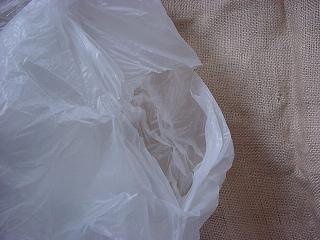After the packaging bags have fulfilled their initial purpose, there are those who will use them to dispose of the garbage container, and there are those who, for the "disposal" purpose, will purchase special "garbage bags", if there are any, why look for simple, economical solutions that are less harmful to the environment.

It doesn't matter what it is - exactly the ethylenic material from which packaging bags are made, we call it plastic. Plastic bags are one of the most irritating, affluent and dangerous nuisances in the new era. You see them on the sides of roads, hanging on trees, on beaches, in the water, and in the air wherever you buy something, the "kind" seller hurries to pack the product in a bag, even if the purchase is a can of drink, candy, or any other commodity for immediate consumption. The bag accompanies every purchase, for the purpose And usually without need.
In supermarkets, shoppers are invited to take as many bags as they want from a "smart" facility, and if you asked for "delivery", be sure that the rice will use twice as many bags as needed.
After the packaging bags have fulfilled their initial purpose, there are those who will use them to dispose of the garbage container, and there are those who, for the "disposal" purpose, will purchase special "garbage bags", if there are any, why look for simple, economical solutions that are less harmful to the environment.
Most types of plastic are made of durable material, almost forever, in any case a bag we used will continue to pollute the environment many generations after we are no longer here. Even when all the "correct" steps are taken to prevent the dispersal of the bags, due to their lightness, they fly around and over the garbage piles and "escape" to the environment before the rest of the garbage is covered.
Bags that "escaped" fly in the sky and are scattered everywhere and in every corner in areas where people gather, kiosks sell sandwiches, drinks, etc., packed in plastic, the sandwich is eaten and the plastic is thrown away and scattered, a plastic bag that is eaten by a wild animal will cause intestinal obstruction and death, many cases are known of: goats, deer, hares, wolves and many others that were found dead and upon examination it turned out that the cause was plastic bags
that blocked vital passages and caused death.
Many cases are known around the world in which marine mammals and turtles have died as a result of swallowing plastic bags
A dead whale was found on the Scottish coast, during the surgery they found 800 kg in its body!!! Plastic bags. 57 kg were found in the digestive tract of Zev-Galdi!!! Plastic bags. During a survey period that lasted a few weeks, about 200 will be found on the shores of Europe!!! Dead animals: dolphins, whales, turtles, and hundreds of seabirds of different species
All died as a result of swallowing or suffocating plastic bags.
Whales, dolphins, turtles and others swallow the bags as a result of misidentification in their "thinking" that these are jellyfish, seabirds become entangled in the bags that they do not recognize during fishing attempts. Bags made of materials that "decompose" are also a risk since plastic "shards" are scattered in the air, on land and in water and when the plastic particles mix with food and are eaten they are poison. The amount of bags for use by supermarkets alone is measured in billions in every country. To these are added the "small" bags in "fast-food" houses, shops and businesses, and the number reaches alarming proportions. Amounts that cause excess volume in landfills and in many cases when the garbage burns the combustion of the plastic causes the emission of toxins into the air.
In order to reduce the damage, the members of the World Environmental Conservation Organization, WWF, demand a tax on the use of plastic bags, that is: instead of the bags being distributed free of charge, there will be a rate that will be paid by anyone who wants a bag. There is no reason why shoppers in supermarkets should not pack their goods in reusable bags , as they did before the plastic generation or alternately will use the same bag a number of times and for a number of uses.
In a number of countries in Africa and Europe, a special tax is already being applied to plastic bags in the hope, and even more so, in the knowledge that such a tax will offset the use of the nuisance by dozens of percent and thus reduce damages.
With us, we will probably have to wait a long time until our residents internalize the fact that there is no need to wrap everything in plastic, and surely there is another place for plastic outside of the beach or the street. Until then, our environment, our landscapes, the animals and all of us, will continue to suffer from the nuisance.
